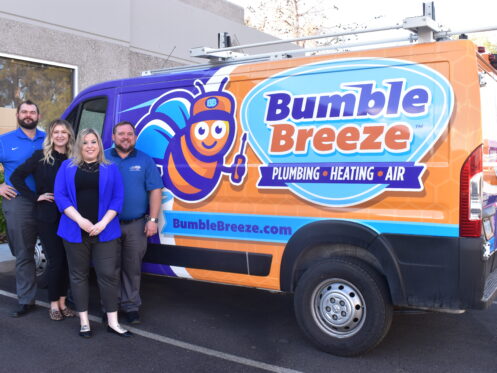Air conditioners and heat pumps are vital in helping to keep homes and businesses comfortable throughout the year. These devices provide much-needed relief during hot summers and help maintain comfortable temperatures during the midst of winter. However, they also consume a significant amount of energy, which can have a negative impact on both your wallet and the environment. This is where SEER ratings come into play.
What Is a SEER Rating?’
SEER stands for Seasonal Energy Efficiency Ratio. This specific ratio is a measure of an air conditioner’s cooling output compared to its energy consumption over an entire cooling season. The higher the SEER rating, the more efficient the unit. In general, older air conditioners and heat pumps have lower SEER ratings, which means they consume more energy to produce the same cooling output as newer, higher-rated models.
It’s important to note that SEER ratings are calculated ahead of time, so there’s no need to worry about fluctuating energy consumption throughout the cooling season. Different types of air conditioners and cooling units will have different SEER ratings based on various factors. Some of these include the type of refrigerant and the compressor type such as variable speed compressors, fan motor efficiency, and proper installation among other things. The overall design of the unit and its age will also play a significant role in energy consumption and SEER ratings as well.
You might also see SEER 2 ratings in use in 2023. This new SEER rating is calculated by running different cooling units under more strenuous conditions that better represent real-world climates. As a result, some SEER-rated products once rated highly, such as SEER 14, might have a slight drop in energy efficiency of one to two points. If you’re installing a new unit into your home, consider asking your HVAC provider about the SEER 2 rating, as this may give you a better idea of how your unit will perform.
Why Are SEER Ratings Important?
SEER ratings help consumers make informed decisions when purchasing air conditioners and heat pumps. Higher-rated units may have a higher upfront cost, but they often result in significant savings over time due to their energy efficiency. This means that while you may be paying a bit more initially, you’ll end up saving money in the long run on your energy bills. Higher-rated units also have a lower environmental impact by reducing overall energy consumption.
In addition to cost savings and environmental benefits, SEER ratings also play a role in regulating energy efficiency standards set by government agencies. In the United States, there is a minimum SEER rating requirement for new air conditioners and cooling units. This number can vary based on location, so it’s important to check with your local government or HVAC contractor to determine the minimum required SEER rating for your area.
In addition, SEER ratings can change year by year. As of 2023, the minimum SEER rating is 14, which is a huge jump from the 13 rating that has been in place since 2006. The change was implemented to encourage the use of more energy-efficient units and reduce overall energy consumption.
High and Low SEER Ratings
Today, you can find air conditioners with SEER ratings ranging from 13 to 25 and even higher. The higher the SEER rating, the more efficient the unit is, but this can also come at a cost. Higher-rated units are generally more expensive upfront, which might not be feasible or necessary for everyone. Fortunately, some mini splits on the market today are not only highly efficient but also better for your wallet and can suffice for smaller homes and offices.
While SEER ratings seem to consistently rise, it’s no surprise that most older homes also find themselves with cooling units rated as low as 11. If you notice a surge in energy costs, know your HVAC system is outdated, and want to improve your home’s energy efficiency, Bumble Breeze can help. Our team of HVAC experts will guide you through the process of choosing the right unit for your home and budget, ensuring you get maximum energy efficiency while also staying comfortable throughout the year.
Choosing the Right SEER Rating
Your HVAC contractor should be able to assist you in choosing the right air conditioner or heat pump for your home or business based on your specific needs and location. They can help you understand SEER ratings and choose a unit that fits both your budget and energy efficiency goals. At Bumble Breeze, our team of HVAC technicians takes special care in understanding your heating and cooling needs and providing the best advice for both residential and commercial buildings. We want to make sure your new cooling system not only has a great SEER rating but also helps you stay within budget and maximize your savings. Below are some factors that might impact your SEER rating and that should be taken into consideration before having your system installed.
Budget and SEER Rated Appliances
You can find a wide variety of good SEER-rated air conditioners and heat pumps at different price points. It’s always wise to have your HVAC contractor guide you in finding the perfect level of efficiency for your budget. Some commercial businesses with higher cooling needs might opt for a SEER 17 or 18 model, while a home with moderate cooling needs might benefit from a SEER 16 model.
However, smaller homes or offices that don’t require heavy cooling might find a SEER 14 unit more than enough to fulfill their needs. In addition, many people also take into consideration their monthly budget and how a new cooling system might impact their energy bills. If you notice high energy costs or frequent repairs for your outdated system, upgrading to a higher SEER-rated unit can save you money in the long run.
Climate and SEER Rated Appliances
The climate in which you live plays an important role in determining the right SEER rating for your air conditioner or heat pump. In hotter climates, it’s important to have a higher SEER-rated system to help combat extreme temperatures and lower energy consumption, leading to cost savings. However, in cooler climates where air conditioning is not always necessary, a lower SEER-rated unit of 14 to 16 may be sufficient.
Humidity levels might also be a factor in determining the right SEER rating for your unit. In more humid areas, a higher-rated unit can help remove excess moisture from the air, making your home more comfortable and reducing the risk of mold and mildew growth.
Stay Ready for the Las Vegas Summer Heat
At Bumble Breeze, we offer a variety of high-efficiency units, from central AC systems to mini splits and heat pumps, to meet your specific needs and budget. Our team of experienced HVAC technicians will guide you through the process, ensuring that you make an informed decision when it comes to your cooling system. We also offer plumbing, water testing, and other services. Contact Bumble Breeze today to learn more about SEER ratings and how we can help keep your home cool during the Las Vegas heat waves.


